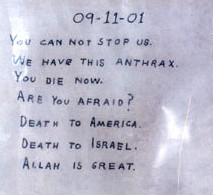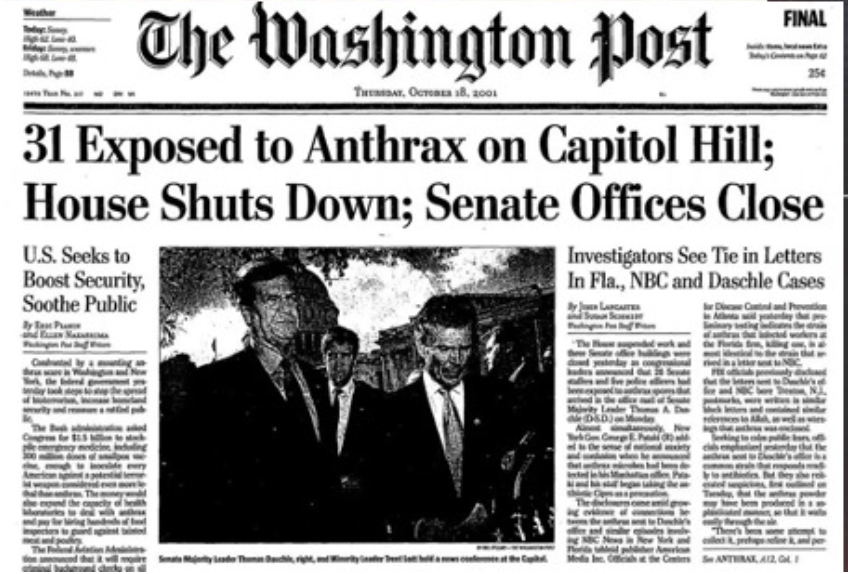Robert F Kennedy Jr on the Patriot Act:
— Matt Couch (@RealMattCouch) April 13, 2023
“It was being held up by two Senators, there was an Anthrax attack on the U.S. Capitol… Who got the Anthrax? Two Senate offices… The two Senators who were blocking the Patriot Act.”
pic.twitter.com/8xTHyG3W22
Fact check
Check out the longer article here. It confirms that the two controlling Democrat Senators were sent anthrax – as highly sophisticated, lab-grown spores. The crude note does not match the level of science involved. The question should be asked: was this terrorism or something more?
On Monday, September 17, 2001 an unusual pattern began to emerge.
Attorney General John Ashcroft announced on this day that he would soon be sending an anti-terrorism proposal to the U.S. Congress and that he would ask Congress to enact the legislation by Friday, September 21. Given the length, complexity and importance of the bill (the Patriot Act) this was an astonishing announcement. He was asking Congress to act with blazing speed and to make an Olympian leap of faith.
On the same day, September 17, an article by Rick Weiss appeared in the Washington Post entitled, “Bioterrorism: An Even More Devastating Threat.” Weiss explained that:
Biological attacks can be far more difficult to respond to than conventional terrorist attacks. For one thing, they are covert rather than overt; for days, no one would know that one had occurred. That’s a huge problem for a disease like anthrax.
If it was peculiar that the announcement of the proposed legislation should correspond with the announcement of a threat of anthrax, it was even more peculiar that the threat was simultaneously being made real. On September 17, or possibly on the following day, letters containing spores of Bacillus anthracis were put in the U.S. mail. As Weiss had suggested, although several people at the targeted sites (news agencies) developed anthrax, for some time after the disease was induced it remained undiagnosed.
The pattern was now established. For over a month following Ashcroft’s announcement, as the Patriot Act made its way through Congress before being signed into law by G. W. Bush on October 26, the bill would be accompanied by anthrax—both the threat and the reality. Perhaps there has never been a piece of legislation in American history that was so clearly forced on Congress by a credible threat of death.
Congress, it seemed, required this death threat. Although it had been traumatized by the 9/11 attacks, it had not been prepared to pass the Patriot Act as quickly as Ashcroft wanted–in the same week it was proposed–and in fact by September 24 the legislation had run into trouble, coming in for criticism in committees of both Senate and House. Ashcroft kept pushing. “Terrorism is a clear and present danger to Americans today,” he said, adding that “each day that so passes is a day that terrorists have an advantage.” On September 25 questions and criticisms continued to arise, so Bush and Cheney entered the fray. Bush said: “we’re at war…and in order to win the war, we must make sure the law enforcement men and women have got the tools necessary.” Cheney, at a lunch with Republican senators, asked them to do their best to get the legislation through Congress by October 5.
On September 30 a major administration offensive began, with the aim of putting pressure on Congress to meet Cheney’s new deadline of October 5. Among the members of the executive branch stepping forward were, in addition to Ashcroft, White House Chief of Staff Andrew Card, Secretary of Defense Donald Rumsfeld, and Secretary of Health and Human Services Tommy Thompson. Card said on television that “terrorist organizations, like al Qaeda…have probably found the means to use biological or chemical warfare.” Tommy Thompson, trying to strike a more reassuring note, assured his television viewers that “we’re prepared to take care of any contingency, any consequence that develops for any kind of biological attack.”
There was nothing subtle about the connection of all these speeches and warnings to the bill the administration wanted passed. The first line in the Washington Post’s October 1 article on the topic was: “Bush administration officials said yesterday there will likely be more terrorist strikes in the United States, possibly including chemical and biological warfare, and they urged Congress to expand police powers by Friday [Oct. 5] to counter the threat.”
But real anthrax, not just threatened anthrax, was again in play by this time, and U.S. Senators were the new targets.
There is no mystery as to why the Senate rather than the House was the target. The Republicans had a comfortable majority in the House and could easily carry the vote regardless of opposition, but in the Senate the Democrats had a majority of one. To become law the Patriot Act had to pass in both houses, and the Democrats were in a position to block it in the Senate. Many of the same proposals that constituted the Patriot Act had been tried out on Congress after the Oklahoma bombing of 1996 and they had, in fact, been blocked. The same danger existed this time, and the more time the Senate had to recover from the trauma of 9/11 the more likely it was that the measures would once again be stopped.
There were two Democratic Senators who were in an especially strong position to halt the legislation. Tom Daschle was Senate Majority Leader. He had a great deal of power in establishing a timeline, negotiating with the opposition party and with the executive, and generally determining whether and in what form the bill would make it through. Patrick Leahy was Chair of the Senate Judicial Committee, the committee that was central to the review of all bills affecting the civil rights of Americans. Leahy was in daily contact with Ashcroft’s office, trying to find formulations of the bill’s measures that he could live with.
Daschle has noted in his account of those days the pressure he and his fellow Democrats were under. Ashcroft, he says, “attacked Democrats for delaying passage of this bill.” “[I]n this climate of anxiety, the attorney general was implicitly suggesting that further attacks might not be prevented if Democrats didn’t stop delaying.”

Although today it may be difficult today to see Daschle and Leahy as champions of civil rights—they both accepted the need for the Patriot Act and worked very hard to get it passed—there were certain times when they drew the line. October 2 was one such occasion. It appears that their opposition on that day nearly got them killed.
Shortly after the October 5 date passed without enactment of the bill, letters containing anthrax spores were sent to Senators Leahy and Daschle. These letters were put in the mail sometime between October 6 and 9.
On October 13, 2001 Leslie Grant, an intern working for Daschle, opened a letter to the senator to find two grams of sophisticated aerosolized B. anthracisspores. The Hart Senate building had to be closed and the senators with offices there relocated.
Taken from: https://ratical.org/ratville/JFK/Sep11PentagonsBMovie/FalseFlagTerror+PassageOf2001PA.html
